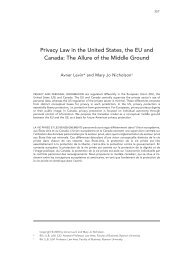Commentary on Fichte's “The Illegality of the Unauthorised ... - uoltj
Commentary on Fichte's “The Illegality of the Unauthorised ... - uoltj
Commentary on Fichte's “The Illegality of the Unauthorised ... - uoltj
You also want an ePaper? Increase the reach of your titles
YUMPU automatically turns print PDFs into web optimized ePapers that Google loves.
150 university <strong>of</strong> ottawa law & technology journal www.<strong>uoltj</strong>.ca<br />
labour <strong>on</strong> physical things is a manifestati<strong>on</strong> <strong>of</strong> our freedom. 48 The state ought<br />
to protect property rights ei<strong>the</strong>r because property manifests <strong>the</strong> exercise <strong>of</strong><br />
a free will or because “private property rights are crucial to <strong>the</strong> satisfacti<strong>on</strong><br />
<strong>of</strong> some fundamental human needs.” 49 Fichte’s view can be made to fit with<br />
such a rights-based <strong>the</strong>ory <strong>of</strong> intellectual property. His view is that intellectual<br />
works manifest a form that expresses <strong>the</strong> unique pers<strong>on</strong>ality <strong>of</strong> <strong>the</strong> individual,<br />
and recogniti<strong>on</strong> <strong>of</strong> this unique form is <strong>the</strong> basis for <strong>the</strong> author’s right in <strong>the</strong><br />
work. However, Fichte’s view is not an exact fit with <strong>the</strong> traditi<strong>on</strong>al articulati<strong>on</strong><br />
<strong>of</strong> <strong>the</strong> rights-based approach. Fichte does acknowledge that an intellectual<br />
work is <strong>the</strong> expressi<strong>on</strong> <strong>of</strong> an individual’s unique pers<strong>on</strong>ality. However, in his<br />
a priori arguments for <strong>the</strong> pro<strong>of</strong> <strong>of</strong> <strong>the</strong> existence <strong>of</strong> copyright, he provides a<br />
phenomenological justificati<strong>on</strong> for this. In his view, <strong>the</strong> individuality <strong>of</strong> each<br />
pers<strong>on</strong>’s ideas is evident in <strong>the</strong> inability <strong>of</strong> any pers<strong>on</strong> to use <strong>the</strong> images or<br />
form <strong>of</strong> <strong>the</strong> ideas <strong>of</strong> ano<strong>the</strong>r to express his own ideas. The inaccessibility <strong>of</strong><br />
<strong>the</strong> minds <strong>of</strong> o<strong>the</strong>rs, which is part <strong>of</strong> our everyday experience, thus leads us<br />
to <strong>the</strong> c<strong>on</strong>clusi<strong>on</strong> that <strong>the</strong> form <strong>of</strong> each pers<strong>on</strong>’s expressi<strong>on</strong> is unique. This<br />
view differs from Kant’s, which is based <strong>on</strong> <strong>the</strong> idea that a state that does not<br />
protect property fails to recognize <strong>the</strong> freedom <strong>of</strong> <strong>the</strong> individual. For Kant,<br />
freedom entails freedom over objects and hence possessi<strong>on</strong>. If <strong>the</strong> state does<br />
not protect property, human freedom is limited by <strong>the</strong> need to c<strong>on</strong>stantly<br />
protect <strong>on</strong>e’s possessi<strong>on</strong>s. 50 Unlike Fichte, Kant’s view <strong>of</strong> property does not<br />
depend <strong>on</strong> a recogniti<strong>on</strong> <strong>of</strong> <strong>the</strong> unique imprint <strong>of</strong> a pers<strong>on</strong>’s individuality <strong>on</strong><br />
his creative works.<br />
Fichte’s view also differs from Hegel’s more elaborate justificati<strong>on</strong> <strong>of</strong><br />
property. For Hegel, <strong>the</strong> recogniti<strong>on</strong> <strong>of</strong> property in things that we possess is<br />
<strong>the</strong> recogniti<strong>on</strong> <strong>of</strong> <strong>the</strong> individual’s power over <strong>the</strong> external world, and hence, a<br />
manifestati<strong>on</strong> <strong>of</strong> his freedom. Or in Justin Hughes’ words, “[t]hrough society’s<br />
acceptance <strong>of</strong> <strong>the</strong> individual’s claims up<strong>on</strong> external objects, possessi<strong>on</strong> becomes<br />
property, and <strong>the</strong> expressi<strong>on</strong> <strong>of</strong> <strong>the</strong> individual becomes more objective.” 51 The<br />
recogniti<strong>on</strong> <strong>of</strong> a right to property is an increase in freedom because, for Hegel,<br />
“social recogniti<strong>on</strong> <strong>of</strong> a pers<strong>on</strong>’s claims to private property dem<strong>on</strong>strates<br />
that <strong>the</strong> individual’s claims comport with that social will.” 52 Fichte does not<br />
provide a justificati<strong>on</strong> for <strong>the</strong> recogniti<strong>on</strong> <strong>of</strong> a property right <strong>on</strong> <strong>the</strong> basis <strong>of</strong> a<br />
recogniti<strong>on</strong> <strong>of</strong> a fundamental aspect <strong>of</strong> human nature such as freedom that is <strong>the</strong><br />
foundati<strong>on</strong> <strong>of</strong> a normative system. Instead, his view is based <strong>on</strong> our experience<br />
<strong>of</strong> generating ideas. Only later, as we will see when we examine <strong>the</strong> relati<strong>on</strong>ship<br />
between Fichte’s views in “Pro<strong>of</strong> <strong>of</strong> <strong>the</strong> <strong>Illegality</strong> <strong>of</strong> <strong>the</strong> <strong>Unauthorised</strong> Reprinting<br />
<strong>of</strong> Books” and his subsequent works, will we understand how this essay<br />
foreshadows Fichte’s view that right is related to self-c<strong>on</strong>sciousness. It is <strong>on</strong>ly<br />
in <strong>the</strong>se later works that we come to see how a legal right can be derived from<br />
<strong>the</strong> phenomenological observati<strong>on</strong> that <strong>the</strong> form <strong>of</strong> a work is <strong>the</strong> expressi<strong>on</strong> <strong>of</strong><br />
<strong>the</strong> unique pers<strong>on</strong>ality <strong>of</strong> an individual.<br />
48. For modern interpretati<strong>on</strong> <strong>of</strong> this view, see Margaret Jane Radin, Reinterpreting Property (University <strong>of</strong><br />
Chicago Press, 1993); and Jeremy Waldr<strong>on</strong>, The Right to Private Property (Oxford: Clarend<strong>on</strong> Press, 1988).<br />
49. Fisher, <strong>“The</strong>ories <strong>of</strong> Intellectual Property,” supra note 40 at p. 171.<br />
50. See Ernest Weinrib, “Poverty and Property in Kant’s System <strong>of</strong> Rights” (2003) 78:3 Notre Dame Law Review<br />
795–828.<br />
51. Hughes, <strong>“The</strong> Philosophy <strong>of</strong> Intellectual Property,” supra note 46 at pp. 333–334.<br />
52. Hughes, <strong>“The</strong> Philosophy <strong>of</strong> Intellectual Property,” supra note 46 at p. 334.









